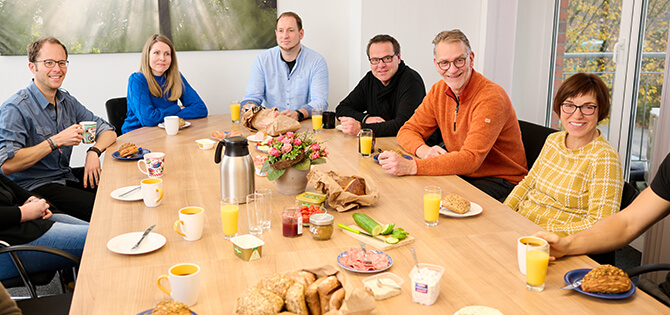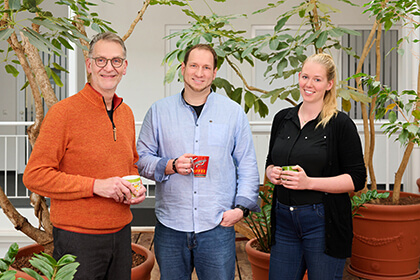Process engineering as an engineering science deals with the transformation of substances. One example of this is the melting of ice, which makes a solid substance liquid. Process engineering thus serves as a bridge between natural science and industrial production and forms the basis of all process industries. But what exactly does process engineering include and which exciting sub-disciplines exist? Find out all the details here!
What Is Process Engineering?
Process engineering is an independent engineering science, which deals with how substances such as gases, liquids or solids are modified in their composition, nature or properties. In process engineering, physical, chemical or biological processes are being used to bring about these changes.
Within the production technology in process engineering, we focus on the production and transformation of substances that do not have a precisely defined form. In contrast, the manufacturing technology involving the further processing of these starting materials into bodies with a clearly defined geometric shape. A simple example is processing grain: You can grind or sift it. We can also extract metals from ores, produce paper or separate the individual components of crude oil.
Process engineering also shows you how important the production network is. In this case, the raw material of a processing process can already be the product of previous processing. The end product can also be further processed. Another exciting field within process engineering is recycling, in which we recover recyclable materials from waste.
A current and important topic in process engineering is energy generation from renewable raw materials, known as bioenergy. Process engineering methods are essential here.
Process engineering is interdisciplinary and is closely linked to other sectors such as metallurgy, chemical engineering, chemistry, apparatus engineering, biotechnology and environmental technology. If you are interested in these diverse connections, you will experience process engineering as an exciting field of engineering.
Responsibilities and Job Profile — What Does a Process Engineer Do?
A process engineer plays a central role in engineering science, which deals with the transformation of materials. Process engineering is about developing and optimizing processes in which substances are modified in their nature, properties and composition. This task requires a deep understanding of chemistry, physics, and mathematics.
As a process engineer in an engineering office, you plan processing steps, develop or select the required equipment and machines, determine methods for transporting substances and find solutions for energy supply. In doing so, you must also ensure that the right measurement, control and regulation techniques are used to control and optimize processes.
Another important aspect of your work is preventing accidents and disposing of waste in an environmentally friendly manner. In process engineering, you often work closely with chemists, business economists and environmental scientists on an interdisciplinary basis. You monitor and improve production processes, develop new technologies and ensure compliance with regulations and standards.
In practice, this means that you may work in various industries, such as the chemical, energy, food or pharmaceutical industries. Here you can work as a researcher in the laboratory, as a developer of simulations, as a project engineer or even as a construction manager. Through your ability to analyze and optimize complex systems, you make a significant contribution to the economic success of production plants.
Process engineering offers a broad and exciting field of activity that opens up a wide range of career opportunities for you. Whether in research, development or in operation — as a process engineer, you are an indispensable part of modern industrial processes.

Subdisciplines of Process Engineering
Mechanical Process Engineering
Mechanical process engineering is a specialized field dedicated to the application of mechanical principles to processing processes. This discipline focuses primarily on the transformation and processing of materials by mechanical action. Its core consists of four main processes: Crushing, agglomerating, mixing and separating. This often involves devices such as filters and strainers.
Your understanding of mechanical process engineering should start with its historical roots in pipeline construction and in solid material processing technology. Traditionally, it also includes storage, conveying and dosing of solids, bulk materials and liquid media, where pumps are often used.
An important aspect of mechanical process engineering is the separation or preparation of heterogeneous mixtures as well as crushing or combining of solids. When chemical companies supply substances that are mixed with unnecessary auxiliary or reactive substances, mechanical process engineering used to mechanically separate the desired substance, provided that it forms a separate phase. Depending on the aggregate state of the components, various techniques are used, such as filters, centrifuges, cyclones, separators and settling tanks.
In addition, the degree of shredding often influences the properties of substances. If a product is required in coarse-grained or powdered form, the shredding is carried out by milling or crushing. As a result of the resulting different particle sizes, a sieving or sifting, in which lighter components are separated by an airflow.
In certain cases, handling the finished products requires the materials to be formed into compressed materials. To do this, mix the components and, if necessary, press them into shapes with a binder.
Mechanical process engineering is not only limited to material processing, but also plays an important role in the food and beverage industry, for example in coffee roasting process or at mixing dough.
Techniques such as particle size analysis, classification of particles, mixing solids and liquids as well as separation of gas/liquid mixtures are central elements in this area. The field offers a wide range of technological solutions, from laboratory equipment to large industrial plants.
Mechanical process engineering is an essential part of many industrial processes and ensures that materials can be processed effectively and high-quality products can be manufactured. A profound understanding of particle mechanics is essential to design and implement efficient and effective processing processes.

Thermal Process Engineering
Thermal process engineering is a specialized area of process engineering that focuses on thermal separation and purification processes. These include:
- Distillation
- Rectification
- Extraction
- Absorption
- Adsorption
These processes are used to separate homogeneous mixtures of substances, often using filler columns or membrane technology.
Distillation is based on the different vapor pressures of the components of a liquid. Since sufficient purity is not always achieved with simple distillation, rectification is being used. Here, steam and liquid are contacted in a countercurrent process, which results in an accumulation of the more readily boiling component in the steam.
Extraction utilizes the different solubility of substances in a solvent. The solvent selectively absorbs a component of the mixture, whereupon the solution is separated from the mixture and the solvent is separated from the extracted substance.
Absorption involves dissolving gas mixture components in a liquid solvent, often used for gas scrubbing. Adsorption on the other hand, refers to the attachment of substances from liquids or gases to the surface of a solid, which removes or extracts substances from the mixture.
Thermal process engineering is strongly rooted in applied thermodynamics and uses thermodynamic material data to execute and optimize processes. Despite the wide range of applications, the individual processes can be assigned to thermal process engineering in different ways, both historically and regionally.
Chemical Process Engineering
Chemical process engineering, also known as chemical reaction engineering, is a central area of process engineering that deals intensively with material transformations through chemical reactions. Your goal is to successfully transfer chemical processes from laboratory scale to industrial or technical scale, a process known as “scale-up.”
This transfer includes, among other things, planning and construction of pilot plants as well as the detailed investigation of reaction kinetics. As a chemical engineer, you are significantly involved in integrating results from the laboratory into the production process and thus enabling the practical application of scientific findings.
In chemical process engineering, the conversion of substances is realized either by synthesis, i.e. the combination of individual substances, or by splitting them into their components. The reaction processes are diverse and are carried out using specific equipment and methods:
- Ideal mixing kettle: Here, reactants are mixed until the desired chemical products have been produced. This often happens in a batch operation, in which the reactor is emptied and refilled after each reaction.
- Stirred tank cascade: For continuous operation, several stirred vessels are connected one after the other. This enables a continuous supply of raw materials and the removal of end products.
- Ideal flow pipe: In this type of reactor, the substances are mixed by turbulences, which are determined by the flow rate and the physical properties of the substances.
Thermal conditions are crucial because there are many chemical reactions the expire exothermic (releasing heat) or endothermic (consuming heat). In order to ensure optimal reaction temperatures, cooling or heating systems are required.
The activation energy is another key variable in process engineering. It defines the amount of energy required for a reaction to start. Catalysts are used to enable reactions at lower activation energies. They enable you to react without being changed yourself (catalysis).
The response rate, which depends significantly on the concentrations of the reactants, pressure, temperature and the reaction mechanism, is decisive for dwell time the substances in the reactor. Determining the reaction rate is a central aspect of reaction kinetics and forms the basis for sizing reactors.
Chemical process engineering therefore forms a bridge between theoretical chemistry and practical application in industry by translating scientific findings into large-scale production processes. As a chemical engineer, you make a significant contribution to the development and optimization of innovative chemical processes and technologies.

Electrochemical Process Engineering
Electrochemical process engineering is a specialized field of engineering science that deals with applying electrochemical principles to solve industrial problems. This area integrates the fundamentals of chemistry, physics and engineering to to develop processes based on electrochemical reactions. Applications include:
- Synthesis of chemicals
- Electrolytic refining of metals
- Batteries and fuel cells
- Sensors
- Surface modification through electrodeposition and etching
- Separation process
- Corrosion protection
These techniques are critical to many aspects of modern industry and technology.
At the core of electrochemical process engineering is ion dynamics in an electric field. Most salts used in electrochemical processes consist of positively charged metal ions (cations) and negatively charged acid residue ions (anions). In an electric field, the following happens:
- Anions move to the positive anode and become oxidized, i.e. they give off electrons.
- Cations move to the negative cathode, where they accept electrons and become reduces.
These movements and reactions are fundamental for processes such as metal separation on workpieces or energy generation in batteries. Electrochemical process engineering is used in a wide variety of industries:
- Electrolytic refining: Through the use of electrolysis, metals such as copper and aluminum are obtained in highly pure form. This is a key process in metallurgy that ensures high purity of the end product.
- Batteries and fuel cells: Electrochemical process engineering plays a central role in the development and optimization of batteries and fuel cells, which serve as efficient energy storage and energy generation systems.
- Galvanic deposition: This involves applying metal layers to workpieces to improve their conductivity, corrosion resistance or aesthetics. This method is often used in electronics and automotive industries.
- Corrosion protection: Electrochemical processes can also be used to prevent corrosion by creating protective layers on metals or integrating corrosion-inhibiting materials into buildings.
Electrochemical process engineering is therefore a discipline that combines fundamental science with practical application in order to create innovative solutions for industry and technology. Your role in process engineering is essential for developing sustainable and efficient industrial processes.

Bioprocess Engineering
Bioprocess engineering, also known as bioprocess engineering or bioengineering, is a specialized area of biotechnology that focuses on process engineering implementation of biological processes. In doing so, material transformations through biological processes are used in technical applications to produce products such as enzymes, drugs or chemicals. These biological processes can be carried out by enzymes that are present in microorganisms such as bacteria, yeasts or fungi, or by isolated enzymes. These processes are described under terms such as biocatalysis, biosynthesis or fermentation.
Areas of Use and Applications
Bioprocess engineering is divided into various areas, which differ in their specific applications:
- White biotechnology (industrial biotechnology): Replaces chemical processes, produces basic and fine chemicals as well as enzymes.
- Red Biotechnology (medical miotechnology): Focused on manufacturing drugs, diagnostics and vaccines.
- Green biotechnology: Deals with the optimization of crops.
- Grey biotechnology (environmental biotechnology): Uses microorganisms to treat environmental resources such as drinking water and waste water.
- Blue biotechnology: Uses marine microorganisms for various applications.
- Yellow biotechnology (food biotechnology): Used in the food industry, for example in the production of beer, yoghurt and sauerkraut.
Technical Implementation and Process Types
Various technical systems are used in bioprocess engineering:
- Bioreactors (fermenters): Microorganisms are cultivated here in order to use their metabolites as end products. They often include agitators, temperature control systems, and other technologies to control process parameters.
- Downstream processing: Fermentation is often followed by complex preparation of the products, which comprises steps such as cell digestion, filtration and chromatography.
Advantages and Disadvantages Compared to Chemical Processes
Biological processes offer several advantages over chemical processes, but also some limitations:
- Benefits: Expire under less extreme conditions and can be preferred for economic and ecological reasons.
- Drawbacks: The limited reaction rate of biological processes often requires larger reactor volumes.
Significance in Research and Industry
Bioprocess engineering plays an important role in research and industrial production by developing and optimizing processes from the laboratory scale to the production scale. This includes the planning and control of production processes as well as ongoing optimization.
With its comprehensive range of applications and innovative technologies, bioprocess engineering makes a significant contribution to the further development and improvement of products and processes in various branches of industry. By integrating biological systems and processes, it offers sustainable alternatives to traditional chemical processes and opens up new possibilities in the biotechnological landscape.

System Process Engineering
System process engineering is a specialized area within engineering science that deals with optimization, design and modelling of process engineering systems. This discipline is part of systems theory and focuses on understanding the dynamic behavior of systems and processes that are involved in material conversion. Here are some key aspects of system process engineering:
- Modelling dynamic behavior: You develop how process engineering systems behave under various operating conditions. This includes constructing mathematical models that can simulate and predict the behavior of systems in real time.
- Optimizing the system structure: The efficiency and performance of process engineering systems depends largely on their structure. System process engineering covers techniques that aim to improve these structures to achieve maximum performance with minimal costs and use of resources.
- Design of subsystems: Another important area is the design of individual components or subsystems that are necessary for effective material conversion. This includes the selection of suitable materials, the design of equipment and the integration of these components into the overall system.
Nanotechnology
Nanotechnology in process engineering refers to using nanotechnology to develop and handle substances and systems that act at the molecular or atomic level. This field is interdisciplinary and combines findings from physics, chemistry, biology and, in particular, process engineering.
The core aspect of nanotechnology in process engineering is nanoparticle technology. Nanoparticles are extremely small, often only a few molecules in size. This small size gives the particles unique optical and electronic properties. These properties are crucial because they not only pose specific challenges in handling and measurement, but also open up completely new applications.
A concise example for this are carbon nanotubes. These differ significantly in their properties from larger graphite particles, which makes them interesting for numerous applications in process engineering. The particular structure and size of nanotubes allows them to be used in various industrial and technological applications, from reinforced materials to applications in electronics and energy storage.
So your understanding of nanotechnology in process engineering should encompass not only the interdisciplinary nature of the field, but also the specific engineering challenges and opportunities that arise from the unique properties of nanoparticles. This requires advanced methods in measurement and manipulation at this tiny scale, which process engineering provides.
Distinction From Other Sciences
Process engineering, also often referred to as chemical engineering technology, is an interdisciplinary engineering science that is fundamentally different from other scientific disciplines. Although it integrates and uses the methods and findings of the natural sciences, its main focus is on the technical and economic implementation of these findings. Here are the key points for differentiating process engineering from other sciences:
- Focus on process optimization: In contrast to other sciences, which often start from an existing process and whose focus is on researching and explaining new phenomena, process engineering focuses on optimally implementing already understood relationships for technical applications.
- Interdisciplinary cooperation: While other natural sciences focus on researching new scientific relationships, process engineering works closely with these disciplines to develop the technical feasibility of new or improved processes.
- Engineering tools: Process engineers use engineering tools to determine the spatial and operational conditions for carrying out processes. Unlike in pure engineering disciplines, such as mechanical engineering, where the focus is on designing the machines themselves, process engineering focuses on designing the entire process flow and optimizing plant technology.
- Sub-areas of process engineering: Within process engineering, there are various specializations that focus on specific aspects:some text
- Chemical engineering: The focus is on chemical processes.
- Environmental technology: Includes legal, toxicological and logistical aspects of supply and disposal.
- Other sub-disciplines such as biological process engineering or membrane process engineering extend the range of applications to specific processes and materials.

Basic Terms Explained
In order to effectively design and optimize processes in industry, a deep understanding of substances, substance properties and the processes used is essential. This knowledge makes it possible to process materials in a targeted manner, improve products and use resources efficiently. They form the basis for overcoming technical challenges and developing innovative solutions in process engineering.
What Are Substances?
In process engineering, we understand a substance to mean any matter that is defined by specific chemical and physical properties. These properties determine how the substance can be used or modified in various processes. Each substance has a mass and takes up a certain space, meaning it has a volume. There are two main categories of substances: pure substances and mixtures of substances.
- Pure substances consist of either a single chemical element or a chemical compound. Examples include water (H2 O), common salt (sodium chloride, NaCl) and iron (Fe).
- Mixtures of substances are composed of two or more pure substances and may be homogeneous or heterogeneous. A homogeneous mixture, such as air or a saline solution, is uniformly distributed. Heterogeneous mixtures, such as an emulsion or a foam, consist of different phases that are not completely mixed together.
What Are the Substance Properties?
Material properties are the characteristics that make up a substance and distinguish it from others. These properties are of central importance in process engineering, as they determine how substances can be processed, separated or converted into other substances. We differentiate between chemical and physical properties.
- Chemical properties relate to the reactivity of a substance and its ability to combine with other substances or to convert into new substances. These include:some text
- Responsiveness
- Chemical bonds
- Composition
- Physical properties can be measured without permanently changing the substance. After measurement, the substance returns to its original state. Important physical properties are:some text
- Density
- Melting point
- Boiling point
- Vapor pressure
- Electrical conductivity
- Thermal conductivity
- Viscosity
- Refractive index
These properties play an essential role in choosing the right process engineering processes to change substances according to type, property and composition. If you know the properties of a substance, you can develop suitable processes to treat or transform it in the desired way.
What Procedures Are There?
In process engineering, there are a variety of processes that are used to change substances according to type, property and composition. These methods are divided into basic operations, which in turn are no longer physically separable. The main processes in process engineering include:
- Change in substance properties
- Shredding: Breaking down solids into smaller particles.
- Chilling: Lowering the temperature of a material.
- Drying: Removing moisture from a fabric.
- Change in substance composition:some text
- Filtration: Separating solid particles from liquids or gases.
- Distillation: Separating liquids with different boiling points.
- Electrolysis: Chemical decomposition by electricity.
- Change of substance type:some text
- Oxidation: Chemical reaction with oxygen.
- Hydration: Attachment of hydrogen to molecules.
- Polymerization: Formation of large molecules (polymers) from monomers.
These basic operations can be combined in various combinations to form complex processes that make up the overall process of a production process.
In addition to these basic procedures, there are special processes that are based on natural processes, such as:
- Molecules formation and decay
- Electrochemical deposition and dissolution
- Metabolism of microorganisms and plants
- Diffusion and osmosis
- Evaporation and evaporation
- Dissolve, absorb and precipitate
- Adsorbing and sedimentation
These processes are highly dependent on parameters such as concentration, temperature, pressure and flow properties. In order to create and maintain the optimal conditions for these processes, process engineering uses findings from the fields of thermodynamics, flow technology and mechanics, supported by measurement and control technology.
Overall, process engineering aims to transform raw materials into usable products or to recover materials, such as in recycling. The variety of processes makes it possible to process and transform a wide variety of materials, from simple chemical compounds to complex components.

Education and Career Prospects
The classic way to become a process engineer is to study process engineering or a related area of engineering. The course is offered at technical universities and colleges in Germany and Austria and is typically divided into the following steps:
1. Bachelor's Degree (3-4 Years)
- Basic subjects: Mathematics, physics, chemistry
- Introduction to engineering sciences: Basic concepts and methods of process engineering
- Special subjects: First introduction to process engineering processes, mechanics, thermodynamics, materials engineering, electrical engineering
2nd Master's Degree (1-2 Years)
- Deepening: In specific areas such as bioprocess engineering, energy process engineering, chemical process engineering, environmental technology
- Research and project work: Intensive practical insight through projects and possible internships in industrial plants, e.g. refineries or chemical production sites
- Conclusion: Master of Science (M.Sc.) or in Austria also graduate engineer (Dipl.-Ing.)
3. Additional Qualifications
- Continuing education and certificates: Specializations in areas such as safety engineering, project management
- Internships: Practical orientation is an important part of training; internships during studies are often mandatory and can be completed in various industrial sectors
Course Content and Focus Areas
The study of process engineering is interdisciplinary. It combines mathematical-scientific content with engineering disciplines as well as electrical and environmental technology. During the course of their studies, students can specialize in specific areas, such as:
- Biological and process engineering
- Process, energy and environmental technology
- Energy technology
- Pharmaceutical technology
- Renewable energy
- Biotechnology and Process Engineering

Career Prospects
Process engineers find jobs in a wide variety of industries, from the chemical industry and mechanical engineering to environmental and energy technology. Your job is in demand in many areas, and additional qualifications or specializations can further improve career opportunities.
An important note: There is currently no numerus clausus for studying process engineering, but this may change depending on demand. Find out about the admission requirements of your desired university in good time.
Process Engineering FAQ
What Is Process Engineering?
Process engineering is an area of engineering that deals with the development, design and optimization of industrial processes. The aim is to convert raw materials into products or to improve existing manufacturing processes. Physical, chemical or biological changes are used here.
What Does Process Engineering Mean?
Process engineering means the application of scientific and mathematical principles to solve problems within production processes in industries such as chemicals, pharmaceuticals, food technology and energy generation.
What Is a Process Engineer?
A process engineer is an engineer who specializes in planning, developing and improving industrial processes. Process engineers are working to optimize efficiency, safety and environmental compatibility in production processes.
What Do Process Engineers Do?
Process engineers design and optimize production systems and processes to manufacture products cost-effectively, safely and sustainably. They analyse problems, develop innovative solutions and implement them in existing or new production lines.
Where Do You Work as a Process Engineer?
Process engineers find employment in various sectors, including:
- Chemical industry
- Pharmaceutical industry
- Food and beverage industry
- Power generation and management
- Environmental technology and waste management
What Does a Process Engineer Earn?
The salary of a process engineer can vary significantly and depends on factors such as professional experience, location and industry. In Germany, the average salary is between 45,000 and 70,000 euros per year.
What Is the Connection Between Energy and Process Engineering?
Energy plays a central role in process engineering, as many production processes are energy-intensive. Process engineers are working to maximize energy efficiency and minimize energy consumption and CO2 emissions. They are also developing technologies for using renewable energy.
Which Textbooks and Expertise Are Recommended?
The following books are recommended for prospective process engineers:
- “Chemical Engineering: A Comprehensive Introduction” by Philip J. D. Lloyd: A thorough introduction to the principles of chemical engineering, covering essential topics with clear explanations suitable for both students and professionals.
- “Perry's Chemical Engineers' Handbook” edited by Don W. Green and Marylee Z. Southard: This classic reference book is an essential resource for chemical engineers, offering detailed information on virtually every aspect of chemical engineering practice.
- “Transport Processes and Separation Process Principles” by Christie John Geankoplis: A detailed and accessible textbook that focuses on the fundamentals of transport processes and the principles behind separation techniques in process engineering.
These plants provide a well-founded introduction and in-depth knowledge in all core areas of process engineering.





Are you an engineer or designer looking for new challenges? With us you can expect a familiar atmosphere and exciting tasks!
View Job Ads Now!



